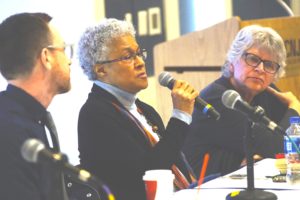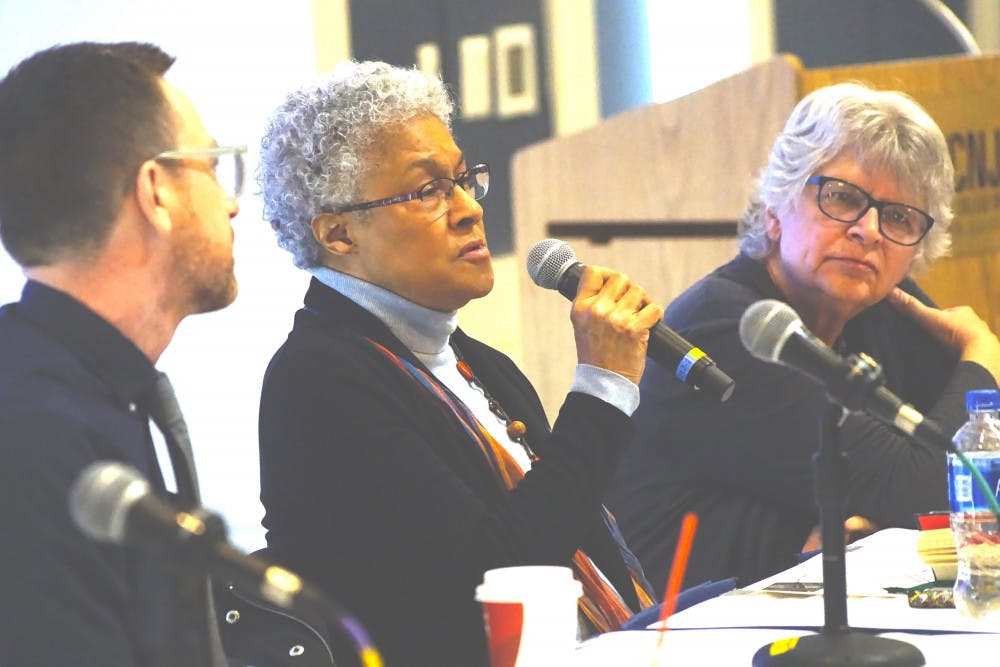By Len La Rocca, Ryan Budzek and Olivia Grasing
Distribution Manager and Correspondents

Students and faculty flocked to the three events featuring Patricia Hill Collins, a prestigious professor of sociology from the University of Maryland on Thursday, April 4, during which she discussed intersectionality and the advances and improvements of contemporary society.
The first event, held in Education Building Room 212 from 10:30 a.m. to 12 p.m., consisted of a panel of professors from various fields of study who were invited to discuss topics pertaining to diversity and social justice. Collins led an interesting conversation about intersectionality and the impact that social justice has had on her life.
The panel of professors and their specializations included Lina Richardson, who studies urban education, Shaun Wiley, who studies psychology and Mary Cannito-Coville, who studies criminology and African-American studies. The panel was moderated by Janet Gray, a professor women’s, gender and sexuality studies.
Their specializations offered the grounds for a rounded discussion about social justice and how their fields are a form of intersectionality created for the betterment of society.
Gray set the tone for the panel by signifying the impact of social justice.
“Social justice is about speaking truth to power — speaking truth to others,” she said.
Intersectionality is defined as the overlapping of social categorizations that creates interdependent systems of discrimination, according to the panel’s on-screen presentation. Collins argues that using intersectionality to examine certain populations, such as impoverished African-American students landing in inadequate education systems, helps scholars and solution-makers to gain a more holistic perspective surrounding the causes of their inequity.
Gabriel Andrei, a senior Spanish major, talked about how his limited knowledge on intersectionality was skewed by those who oppose it.
“Prior to coming here, I didn’t know a whole lot about intersectionality,” Andrei said. “In fact, most of what I heard about it was people who are against it describing it in a way that it really isn’t. I’m really glad that there was Dr. Collins, an expert on the subject. She broke it down and talked about what it is and what it’s not.”
Collins left the audience with her description of the passion that drives her to advocate for awareness of intersectionality and her work in the world
of sociology.
After the panel, a discussion with Collins took place from 2 p.m. to 4 p.m. in the same room. The discussion was in a fishbowl format where the inner circle, which consisted of Collins and 15 students, did most of the talking. The audience that surrounded the inner circle was given chances to contribute to the discussion.
The students in the inner circle began the discussion by expressing how Collins’ work has impacted them personally.
Themes of self-analysis and global perspective dominated the next part of the discussion. When asked how privileged identities shape intersectional concerns, many of the students responded by saying that they have learned to focus on their privileges, rather than areas where they have been oppressed growing up.
“I think we have to take the time to realize that many people at The College of New Jersey come from different backgrounds,” said Connor Holden, a junior biology major. “Promoting conversations between different groups of people on campus will help us see these differences.”
Another big topic of discussion was the importance of forming coalitions to take steps towards activism and social justice. When speaking on this topic, Collins emphasized the importance of focusing on an outcome.
“Inclusion is the outcome I would like to see on campus,” said Adjo Agbobli, a junior African-American and women’s, gender, and sexuality studies double major. “I believe that everyone should feel like they belong.”
When speaking about coalitions, the inner circle said that in today’s society, everyone has different realities. The definition of freedom can vary from person to person because of the fact that individuals have different beliefs, authorities and privileges.
“Intersectionality is about power,” Collins said. “An individual’s confidence may depend on the environment they are surrounded by, and if they are the minority in the group they may restrain from speaking their mind. A community, such as the one at the College, must focus on making the environment feel as comfortable as possible, so everyone will feel like they have the power to state their opinions and beliefs.”
The conversation then moved to the Mayo Concert Hall from 5 p.m. to 7 p.m., where more than 300 students packed into the room to hear what Collins had to say concerning intersectionality and political activism.
The professor reflected on her life experience and how it affected her work, how circumstance gave the Baby Boomers their reputation and how the nature of social categories could change that story.
“Intersectionality really challenges a story like that boomer generation — you have to look at it with race, class, gender — all of those things go into that generation,” Collins said. “The stock story is not intersectional at all — it argues that youth have distinct social locations within intersectional power relations. Intersectional arguing would say that boomer story leaves out everybody except a small group.”
Collins drove home the fact that every new generation has a power the ability to be catalysts of change.
“Each age comes with its own authority,” she said. “Critical thinking and independent thinking is crucial for young people.”
Collins left audiences with the perception that while her work is not easy, it is ultimately a rewarding subject to dive into head-first.
“I am in my work and my work is in me,” Collins said. “I want to be completely honest about how I do this work. It is not glamorous — there are moments of glory, but you have to do this work everyday.”







